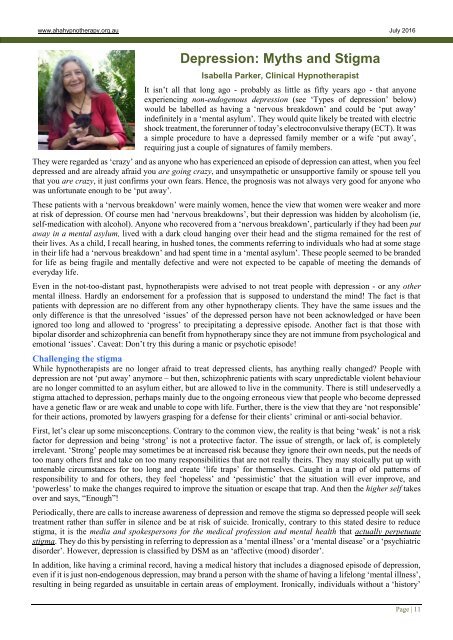The Australian Hypnotherapy Journal
296nlgS
296nlgS
You also want an ePaper? Increase the reach of your titles
YUMPU automatically turns print PDFs into web optimized ePapers that Google loves.
www.ahahypnotherapy.org.au July 2016<br />
Depression: Myths and Stigma<br />
Isabella Parker, Clinical Hypnotherapist<br />
It isn’t all that long ago - probably as little as fifty years ago - that anyone<br />
experiencing non-endogenous depression (see ‘Types of depression’ below)<br />
would be labelled as having a ‘nervous breakdown’ and could be ‘put away’<br />
indefinitely in a ‘mental asylum’. <strong>The</strong>y would quite likely be treated with electric<br />
shock treatment, the forerunner of today’s electroconvulsive therapy (ECT). It was<br />
a simple procedure to have a depressed family member or a wife ‘put away’,<br />
requiring just a couple of signatures of family members.<br />
<strong>The</strong>y were regarded as ‘crazy’ and as anyone who has experienced an episode of depression can attest, when you feel<br />
depressed and are already afraid you are going crazy, and unsympathetic or unsupportive family or spouse tell you<br />
that you are crazy, it just confirms your own fears. Hence, the prognosis was not always very good for anyone who<br />
was unfortunate enough to be ‘put away’.<br />
<strong>The</strong>se patients with a ‘nervous breakdown’ were mainly women, hence the view that women were weaker and more<br />
at risk of depression. Of course men had ‘nervous breakdowns’, but their depression was hidden by alcoholism (ie,<br />
self-medication with alcohol). Anyone who recovered from a ‘nervous breakdown’, particularly if they had been put<br />
away in a mental asylum, lived with a dark cloud hanging over their head and the stigma remained for the rest of<br />
their lives. As a child, I recall hearing, in hushed tones, the comments referring to individuals who had at some stage<br />
in their life had a ‘nervous breakdown’ and had spent time in a ‘mental asylum’. <strong>The</strong>se people seemed to be branded<br />
for life as being fragile and mentally defective and were not expected to be capable of meeting the demands of<br />
everyday life.<br />
Even in the not-too-distant past, hypnotherapists were advised to not treat people with depression - or any other<br />
mental illness. Hardly an endorsement for a profession that is supposed to understand the mind! <strong>The</strong> fact is that<br />
patients with depression are no different from any other hypnotherapy clients. <strong>The</strong>y have the same issues and the<br />
only difference is that the unresolved ‘issues’ of the depressed person have not been acknowledged or have been<br />
ignored too long and allowed to ‘progress’ to precipitating a depressive episode. Another fact is that those with<br />
bipolar disorder and schizophrenia can benefit from hypnotherapy since they are not immune from psychological and<br />
emotional ‘issues’. Caveat: Don’t try this during a manic or psychotic episode!<br />
Challenging the stigma<br />
While hypnotherapists are no longer afraid to treat depressed clients, has anything really changed? People with<br />
depression are not ‘put away’ anymore – but then, schizophrenic patients with scary unpredictable violent behaviour<br />
are no longer committed to an asylum either, but are allowed to live in the community. <strong>The</strong>re is still undeservedly a<br />
stigma attached to depression, perhaps mainly due to the ongoing erroneous view that people who become depressed<br />
have a genetic flaw or are weak and unable to cope with life. Further, there is the view that they are ‘not responsible’<br />
for their actions, promoted by lawyers grasping for a defense for their clients’ criminal or anti-social behavior.<br />
First, let’s clear up some misconceptions. Contrary to the common view, the reality is that being ‘weak’ is not a risk<br />
factor for depression and being ‘strong’ is not a protective factor. <strong>The</strong> issue of strength, or lack of, is completely<br />
irrelevant. ‘Strong’ people may sometimes be at increased risk because they ignore their own needs, put the needs of<br />
too many others first and take on too many responsibilities that are not really theirs. <strong>The</strong>y may stoically put up with<br />
untenable circumstances for too long and create ‘life traps’ for themselves. Caught in a trap of old patterns of<br />
responsibility to and for others, they feel ‘hopeless’ and ‘pessimistic’ that the situation will ever improve, and<br />
‘powerless’ to make the changes required to improve the situation or escape that trap. And then the higher self takes<br />
over and says, “Enough”!<br />
Periodically, there are calls to increase awareness of depression and remove the stigma so depressed people will seek<br />
treatment rather than suffer in silence and be at risk of suicide. Ironically, contrary to this stated desire to reduce<br />
stigma, it is the media and spokespersons for the medical profession and mental health that actually perpetuate<br />
stigma. <strong>The</strong>y do this by persisting in referring to depression as a ‘mental illness’ or a ‘mental disease’ or a ‘psychiatric<br />
disorder’. However, depression is classified by DSM as an ‘affective (mood) disorder’.<br />
In addition, like having a criminal record, having a medical history that includes a diagnosed episode of depression,<br />
even if it is just non-endogenous depression, may brand a person with the shame of having a lifelong ‘mental illness’,<br />
resulting in being regarded as unsuitable in certain areas of employment. Ironically, individuals without a ‘history’<br />
Page | 11


